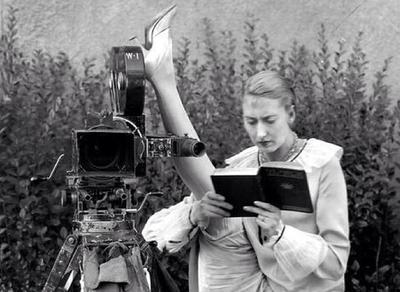Research Method
The project will blend conventional historical methods of archival research and research on the press, whose value has been underlined by the new film history and new cinema history, with techniques developed within production studies and family history. It will adopt oral history to capture experiences that have remained largely or completely undocumented.
Our research method consists of 4 phases :-

1. Data collection - Archival material
The project will work in partnership with the Cineteca di Bologna. The Cineteca holds the extensive personal archives of the directors Alessandro Blasetti and Vittorio De Sica, as well as the archive of the producer Franco Cristaldi. These will all be searched and interrogated with a view to highlighting gendered labour and overlooked professional stories. The Cineteca also hosts the archives of the production manager and assistant director Mara Blasetti, and of documentary maker Cecilia Mangini. The two archives are of critical importance in re-framing understandings of the place of women. Strategies will be developed for reading them in a new way and making them accessible through critically informed cataloguing and digitisation. These interventions will be shaped by the consultation of eighteen other women’s archives that have been identified including those of producers, production managers, casting directors, script supervisors, and lawyers.
Moreover, the project will consult and selectively digitise the papers of Suso Cecchi d’Amico (the leading screenwriter in Italy in 1950s and 1960s) and her daughters Caterina D’Amico (producer, educator, and former head of CSC) and Silvia D’Amico Bendicò (agent, screenwriter, and producer).
2. Data collection - Oral History
Extended oral testimonies will be gathered (and video-recorded) on the basis of semi-structured interviews with circa 30 women active in the industry over part of the period covered by the project.A small sample of eight interviews will be conducted with present practitioners to situate contemporary experiences in relation to historical testimonies.
3. Data Analysis - Coding of the video-interviews and archival material.
The ethnographic approach will involve the identification of the main topics in the oral testimonies by a systematic coding through the use of NVivo software. Qualitative analysis of the video-interviews will be carried out using a data-driven codebook which will be developed specifically for this project. The thematic analysis of the video interviews will be triangulated with the archival material, in order to cross-reference the thematic analysis in both textual and non-textual data, oral history and archival sources.
4. Data Validation and public engagement events
Results of the data analysis will be validated in two workshops (one in the UK, one in Italy), where project participants, stakeholder organisations, media practitioners, and researchers will be invited to comment on the outcomes of the research, as well as to engage with and provide feedback on the digital archive.